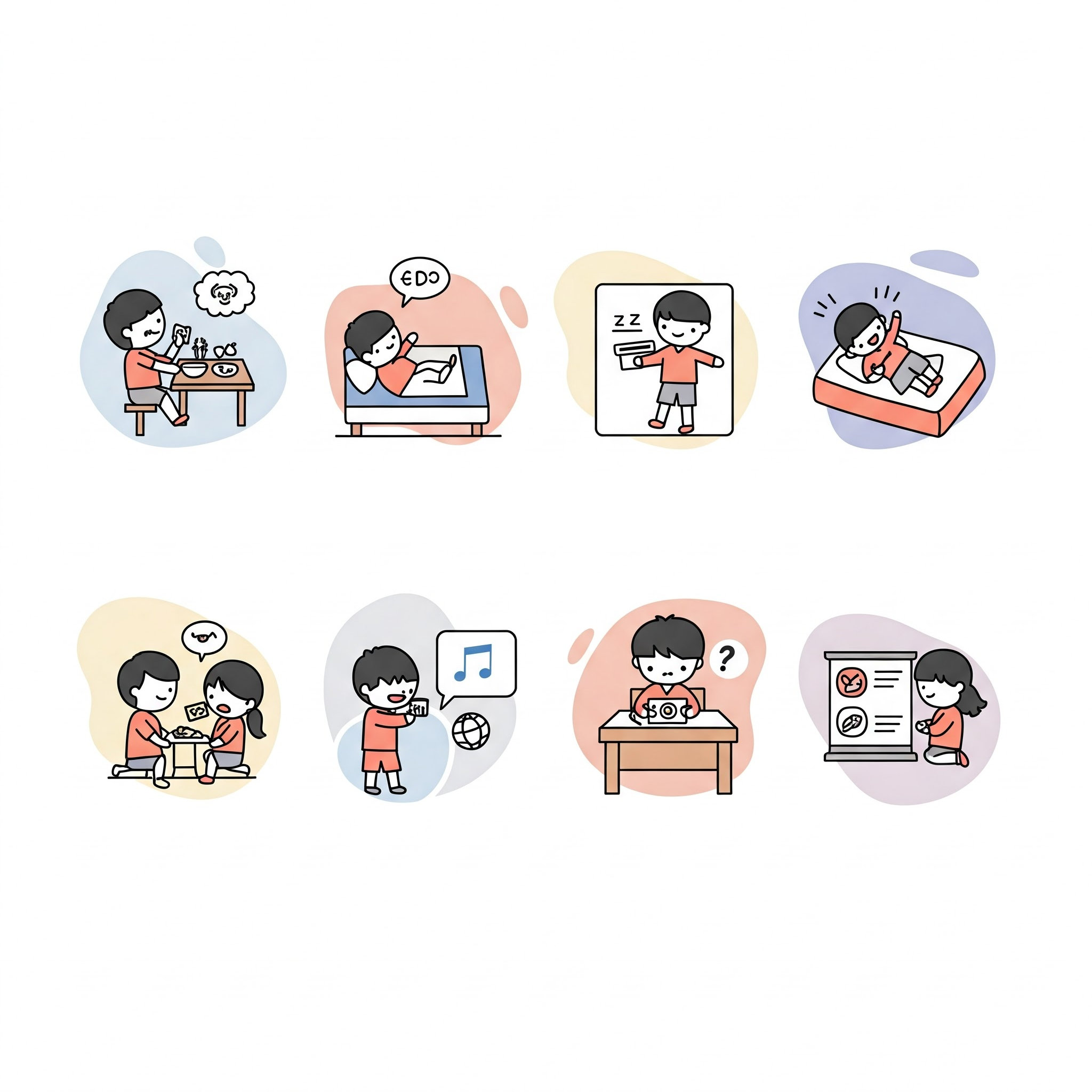Daily Activities in Chinese
Being able to talk about your daily routine is essential for basic conversations in Chinese! In this lesson, you'll learn common activity verbs and time expressions to describe what you do every day.
Basic Daily Activities
Let's learn these common verbs for everyday activities:
More Daily Activities
Here are some more important actions that are part of most people's routines:
Time Expressions
These words help you talk about when activities happen:
Understanding Daily Activity Words
Let's learn more about each of these important daily activity verbs:
Get Up
起床get up means "to get up" or "to wake up" - the way to describe how you start your day. For example: 我六点起床 (I get up at 6 o'clock).
Take a Shower
洗澡to take a bath/shower means "to take a shower/bath" - a common morning or evening activity. For example: 我早上洗澡 (I take a shower in the morning).
Brush Teeth
刷牙to brush teeth means "to brush teeth" - an essential part of most people's morning and evening routines. For example: 我每天刷牙两次 (I brush my teeth twice a day).
Eat (a Meal)
吃饭to eat (a meal) means "to eat a meal" - a general term for eating any meal. For example: 我们七点吃饭 (We eat at 7 o'clock).
Go to Work
上班be on duty means "to go to work" - what most adults do on weekdays. For example: 我八点上班 (I go to work at 8 o'clock).
Understanding More Activity Words
Now let's learn about these additional daily actions:
Get Off Work
下班to get off work means "to get off work" or "finish work" - the end of the workday. For example: 我五点下班 (I get off work at 5 o'clock).
Work
工作work, job means "to work" - the act of doing your job. For example: 我在公司工作 (I work at a company).
Study
学习study, learn means "to study" - what students do at school or at home. For example: 我晚上学习中文 (I study Chinese in the evening).
Watch TV
看电视to watch TV means "to watch TV" - a common leisure activity. For example: 我喜欢看电视 (I like to watch TV).
Sleep
睡觉sleep, go to bed means "to sleep" or "to go to bed" - how everyone ends their day. For example: 我十一点睡觉 (I go to sleep at 11 o'clock).
Understanding Time Expressions
These time words help you explain when you do activities:
Every Day
每天every day means "every day" - used to talk about daily habits and routines. For example: 我每天运动 (I exercise every day).
Morning
早上morning means "morning" - the time from when you wake up until noon. For example: 早上我很忙 (I'm very busy in the morning).
Noon
中午noon means "noon" or "midday" - usually referring to the period around 12pm. For example: 中午我吃午饭 (I eat lunch at noon).
Evening
晚上evening, night means "evening" or "night" - the time after sunset. For example: 晚上我看书 (I read books in the evening).
Mini Daily Routine Dialogues
Try practicing these simple conversations about daily activities:
Dialogue 1: Morning Routine
Dialogue 2: Work Schedule
Dialogue 3: Evening Activities
More Daily Activities
Here are a few more useful daily activity verbs:
- 听音乐 - "to listen to music" - a popular leisure activity
- 看书 - "to read books" - a common way to learn or relax
- 运动exercise - "to exercise" - important for staying healthy
- 吃早饭 - "to eat breakfast" - the first meal of the day
- 吃午饭 - "to eat lunch" - the midday meal
- 吃晚饭 - "to eat dinner" - the evening meal
Useful Sentence Patterns
Here are some patterns for talking about your daily schedule:
- 我每天...点... - I ... at ... o'clock every day
- 早上我.../中午我.../晚上我... - In the morning/at noon/in the evening, I...
- ...之后,我... - After..., I...
- 我先...,然后... - I first..., then...
Cultural Notes about Daily Life in China
Understanding these cultural aspects will give you insight into daily routines in China:
- Early rising is common in China, with many people starting their day around 6am
- Morning exercise in parks is popular, especially among older people
- Lunch breaks are often longer in China (1-2 hours) and may include a short nap
- Dinner time tends to be earlier than in Western countries, often around 6-7pm
- Evening activities often include group dancing, walking after dinner, or family time
Practice Tips
- Describe your own daily schedule using the vocabulary from this lesson
- Create a timeline of your day with Chinese labels for each activity
- Practice asking 你几点...? questions to learn about others' routines
- Compare weekday and weekend routines using these activity words
With these daily activity words and time expressions, you'll be able to talk about your schedule and routines in Chinese! Whether you're explaining your work day, discussing your morning habits, or making plans with friends, these terms will help you communicate about everyday life.
